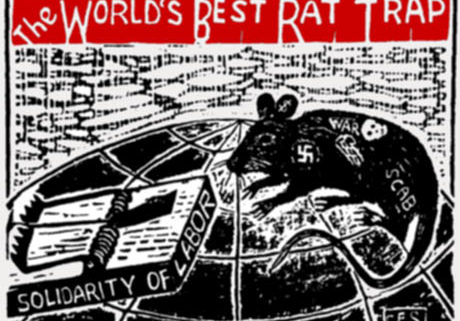The Origins of Solidarity Unionism: Minority report 4
Most union campaigns are organized around the problems experienced in the workplace or in a specific industry. Workers set up committees, a campaign is launched, and the problems experienced in the workplace are explained so as to increase the support given to the union. Generally, this type of organization is obtaining formal recognition by employers in accordance with legal procedures in place, to a collective agreement is negotiated.
But what happens when it comes time to negotiate the Convention? It is wrong to believe that labor and management are involved in this process on an equal, and that this process is emerging agreement that benefits everyone. In the context of accredited unionism, unions enter into the negotiation process in a weak position : their legitimacy as a union and the satisfaction of their claims primarily depend on the good faith of the employer class, rather than the implementation of proactive responses.
The concept of "labor peace", applied in Canada including the Rand Formula and the adoption of laws for union certification, As was the case of employers that governments and union bureaucracies : employers had enough of fighting unionism and its disruptive methods (occupations, manifestations, strikes, sit-ins, etc.), governments were tired of having to help large companies to Sort this out after every labor dispute, and the trade union bureaucracy was tired of having to "manage" the members who claim to be respected. The system of collective agreements was therefore set up to give the employers a legal responsibility to negotiate the conditions of workers with union, framed by rules and laws that essentially restrict the labor scope to legal and rhetorical joust.
Traditionally, it is assumed that as the target company is profitable, unions and the employing class enjoying the renewal of collective agreements or the renegotiation of employment contracts to improve conditions for workers. However, this is not the case : it is very common that companies, unionized or not, close plants, branches or offices, abolish positions, reduce wages and benefits, and generally show no compassion for workers, even when business is good. Furthermore, it is common - and generally expected - that the agreements and contracts contain a series of clauses and managerial prerogatives completely useless and absurd, even harmful, for workers.
Since many unions seem to believe that workers should be "e-s-managed" by bosses who do what they want, Most collective agreements and employment contracts traded give the employers a total control over the workplace. Furthermore, by collecting contributions directly on the payroll of their members, accredited unions have an interest in encouraging them not to strike, or lose a portion of their income and having to support the strikers disturbances.
When we think about the means available to us to transform the trade union movement, we must take into account these elements, and can not limit ourselves to saying "better organize our workplaces"; As we have not solved the problem obliging unions which do nothing to help their members take control of their environments, we will be stuck-e-s in a loss to negotiating paradigm with an entrepreneurial class that decides the agenda.
Comment, so, do we get out of this game which we do not have written rules? We must first and foremost stop making legal recognition and contract negotiation top priorities. Although our unions and solidarity networks must be able to act to resolve issues at the source of most union campaigns (wages, social advantages, working conditions, etc.), it is absolutely necessary to be respected as workers, as well as having control over our workplaces and on how our work connects us to our community and the world. We need to create a context in which they are the bosses and bosses, and not the unions, who want the signing of an agreement; we must create an environment in which it is the employers who fell to his guns to get our collaboration. This is an important part of the potential offered by the solidarity struggle unionism.
The objective of this unionism, as promoted by the SITT-IWW, is to organize the workers so that our power can not be ignored by employers and governments, or recovered by facade union. The Solidarity trade union movement is one of the ways to achieve it, since the goal of our struggle is not simply to sign a contract or obtain legal status.
In fact, as much as possible, we must avoid giving our collective power to substitute a contract or a legal framework; if the contracts and agreements help us make our bosses and bosses accountable by obliging them to respect their commitments, it is very good. But if negotiation is not a process by which we negotiate what we lose as rights and benefits, and by which we legitimize a total employers' control over us as workers, there is definitely something wrong.
Note: This article was translated from English and adapted to the Canada-Quebec reality by x377545. In the original text, the author evoked specifically in the American context the procedure Card check recognition and union election process, supervised by the National Labor Relations Act (NLRA).
The series of “minority reports” was written and published in 2002 on the website of the IWW, by Alexis FW Buss.
Link to original article: https://www.iww.org/about/solidarityunionism/explained/minority4








Leave a Reply
Want to join the discussion?Feel free to contribute!